Live on the homepage now!
Reader Supported News
If someone has planted a time bomb in your home, you are entitled to dismantle it. The same applies to our planet
In Berlin, half a dozen young climate activists calling themselves ‘The Last Generation’ recently went on a hunger strike, eventually refusing liquids and becoming quite frail before calling the action off. But there are other things than our own bodies that can be shut down. In conjunction with this summer’s Ende Gelände camp against fossil gas, a group calling itself ‘Fridays for sabotage’ claimed responsibility for rupturing a piece of gas infrastructure and urged the movement to embrace this tactic: ‘There are many places of destruction, but just as many places of possible resistance.’ This followed the development of a veritable archipelago of forest occupations in Germany, some of which have damaged equipment for coal extraction.
To stay in the global north, the long and bitter struggles of Indigenous peoples against never-ending new pipeline projects in Canada and the US have spawned some desperate militancy: trains carrying crude oil have been derailed by activists mimicking the signal of emergency brakes.
Fossil capital should take notice. New forms of resistance are coming.
Parts of the earth are becoming unliveable. Facts like that, however, are in no real need of repetition. By now everyone knows, at some level of their consciousness, what is at stake. And still our governments allow fossil fuel companies to expand their installations for taking oil and gas and coal out of the ground. They cannot even bring themselves to stop showering such companies with trillions of dollars of subsidies.
One doesn’t need to look at rogue denialists like Bolsonaro or Trump or, for that matter, the far-right government of Modi, which presides over a transition to ever-more fossil fuels: any well-mannered state will do.
Take France, whose president poses as the most enlightened climate diplomat. The largest private company headquartered in that nation, Total, will this year commence construction of the East Africa Crude Oil Pipeline, slated to be the longest in the world, cross 230 rivers, bisect 12 forest reserves and drive 100,000 people from their land: all to carry even more crude oil to the world-economy for burning. Macron backs the pipeline as an amazing opportunity to increase ‘French economic presence’ in the region.
Or take the US, where Biden is surpassing his predecessor in generosity to fossil fuel companies, showering them with drilling licenses at a pace not seen since George W Bush. Two dozen fossil fuel projects – new pipelines, new gas terminals – underway in that country would alone cause emissions equal to 404 coal-fired power-plants.
As for the UK government, it remains committed to ‘maximising economic recovery’ of oil and gas in the North Sea – pumping out as much of it as possible, that is. Germany expands its autobahn and coal mines. ExxonMobil barrels on with a high-risk off-shore drilling project in a very delicate marine ecosystem in Guyana. Between 2020 and 2022, Shell will have put 21 new major oil and gas projects online.
Overall, the production of fossil fuels needs to be brought down to zero as fast as humanely possible, but in the real world, producers are planning to increase extraction as if there is no tomorrow. One recent paper shows that the bulk of all known reserves must be left in the ground for there to be at least a slim chance of avoiding more than 1.5C degrees of warming; to be more exact, by 2050, some 90% of all the coal would have to remain untouched, 60% of the oil, 60% of the gas, 99% of the unconventional oil.
But these are, the researchers stress, likely to be underestimates, since the modelling is based on a 50% chance of meeting the 1.5C degrees target and does not include feedback mechanisms. If the chance is raised to 70 or 80% and the recursive loops of a climate system breakdown – notably forest fires – were accounted for, even more would have to stay underground: nearly all fossil fuels, starting about tomorrow. By its very nature, fossil capital cannot countenance such a limit. Compulsively, uninhibitedly, it instead digs around for more and more to extract and then some more.
For every day that passes, this conclusion receives further confirmation: the ruling classes of this world are constitutionally incapable of responding to the catastrophe in any other way than by expediting it. Unfortunately, COP26 did not produce any compelling reasons to revise that conclusion. Less than a week after the end of the summit, the Biden administration held the largest federal offshore drilling auction in US history.
There is little to suggest that any other government signing the Glasgow Pact will behave differently.
So what do we do?
We could destroy the machines that destroy this planet. If someone has planted a time bomb in your home, you are entitled to dismantle it. More to the point, if someone has placed an incendiary device inside the high-rise building where you live, and if the foundations are already on fire and people are dying in the cellars, then many would believe that you have an obligation to put the device out of action.
This is the moral case which, I would argue, justifies destroying fossil fuel property. That is completely separate from harming human bodies, for which there is no moral case.
And this particular moral case for direct action is, I believe, overwhelmingly strong, if the realities of the climate catastrophe are recognised. On that premise, how could the physical integrity of fossil fuel property possibly be given precedence? Boris Johnson recently made what might generously be interpreted as an attempt to do so, when he defended the Cambo oilfield, one in the endless series of fresh investments in fossil fuel infrastructure of the kind we just can’t live with: “we can’t just tear up contracts”, he said.
In this view, a contract with an entrepreneur for augmenting the device sending the flames ever higher must be honoured. It takes priority over any other concern. Just why it should have that sanctity, however, seems to me exceedingly difficult to tell.
In the meantime, we can observe that slowing down the climate catastrophe means, by definition, the destruction of fossil capital: there can be no more profiting from fossil fuels. And if governments are incapable of initiating this work, because they take their orders from the top floors, then others should do so. Not because activists can accomplish the abolition of fossil fuels – only states have that potential – but because their role is to ratchet up the pressure for it.
So could the climate movement in the global north achieve its goals by sending cadres or crowds to actually tear machines apart? An unassailable ethical imperative does not necessarily translate into efficacious action. We have received this lesson from the highways of the UK, where the main achievement of Insulate Britain has been rising fury from working-class people on the way to their jobs.
We are deep into the catastrophe; the hour is late, but the escalation has only just begun. We don’t know what exactly will work. The one thing we can be certain of is this: we are in a death spiral, we have to break out of it, and we must try something more. The days of gentle protest may be long over.
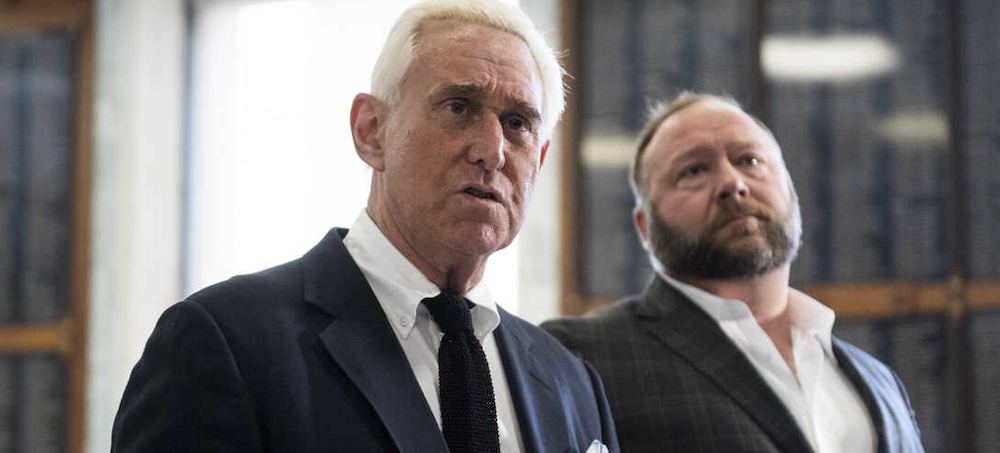 Roger Stone, left, and Alex Jones hold a press conference before attending a House Judiciary Committee hearing. (photo: Bill Clark/CQ-Roll Call/Getty Images)
Roger Stone, left, and Alex Jones hold a press conference before attending a House Judiciary Committee hearing. (photo: Bill Clark/CQ-Roll Call/Getty Images)
The committee has asked Stone and Jones to provide testimony by Dec. 17 and Dec. 18, respectively, and to provide the panel with requested documents by Dec. 6.
Rep. Bennie G. Thompson (D-Miss.), the committee’s chairman, wrote that Jones’s coordination with Cindy Chafian and Caroline Wren in organizing the rally that preceded the attack on the Capitol, along with his promotion of Trump’s false claims of election fraud and urging of people to travel to Washington for the Jan. 6 rally, make him a person of interest.
Thompson cites Stone’s appearance at rallies on Jan. 5 at the Supreme Court and Freedom Plaza as reason for the subpoena, along with his use of “Oath Keepers as personal security guards, several of whom were reportedly involved in the attack on the Capitol and at least one of whom has been indicted.”
The roles that the high-profile right-wing figures played in the Jan. 6 Capitol breach — and their potential ties to those who committed violence in the riot — are also being investigated by the Justice Department and the FBI. The investigation is ongoing.
Investigators have been working to determine whether Stone and Jones, the host of Infowars, should face potential criminal charges for influencing Capitol rioters through their networks and actions.
In a statement, Stone said he had yet to receive the subpoena but denied any responsibility for the violence on Jan. 6.
“I have said time and time again that I had no advance knowledge of the events that took place at the Capitol on that day,” he said. “Any statement, claim, insinuation, or report alleging, or even implying, that I had any involvement in or knowledge, whether advance or contemporaneous, about the commission of any unlawful acts by any person or group in or around the U.S. Capitol or anywhere in Washington, D.C. on January 6, 2021, is categorically false.”
Stone, a longtime confidant of Trump, has amplified the former president’s false claims that the 2020 election was stolen and rife with voter fraud in the weeks leading up to the attack.
Records and documents previously reviewed by The Washington Post show that Jones and Stone have promoted extremist groups such as the Proud Boys and Oath Keepers and have ties to some individuals who have already been charged by the government with coordinating and planning certain parts of the breach.
Jones has spread numerous false claims about a variety of topics over the years, and courts have recently ruled he must pay damages in lawsuits filed by the families of eight people killed in the 2012 mass shooting at Sandy Hook Elementary School after he falsely said the deadly attack was a “hoax.”
Jones did not respond to a request for comment.
The committee has also subpoenaed conservative activists Dustin Stockton and Jennifer Lawrence — a couple with ties to some of the rally organizers who have already been subpoenaed by the committee. The committee letters cite Stockton and Lawrence’s work with Women for America First in organizing rallies held after the November 2020 election “in support of then-President Trump and his allegations of election fraud, up through and including the rally held on the Ellipse in Washington, D.C. on January 6, 2021.”
Stockton and Lawrence released a statement accusing the committee of not acting in good faith for subpoenaing them during the week of Thanksgiving.
“In the many months since January 6th we have granted many reporters and outlets extensive on-the-record interviews because we are committed to getting to the truth about what happened,” they wrote. “We remain committed to that transparency and pray for the opportunity to share our experiences to the public without the taint of misinformation that has become customary.”
Taylor Budowich, a current spokesperson for Trump, was also subpoenaed Monday and has been asked to produce documents and appear for a deposition Dec. 16. The committee cited Budowich efforts that included “directing to the 501(c) (4) organization approximately $200,000 from a source or sources that was not disclosed to the organization to pay for the advertising campaign” for the Jan. 6 rally. He did not respond to a request for comment.
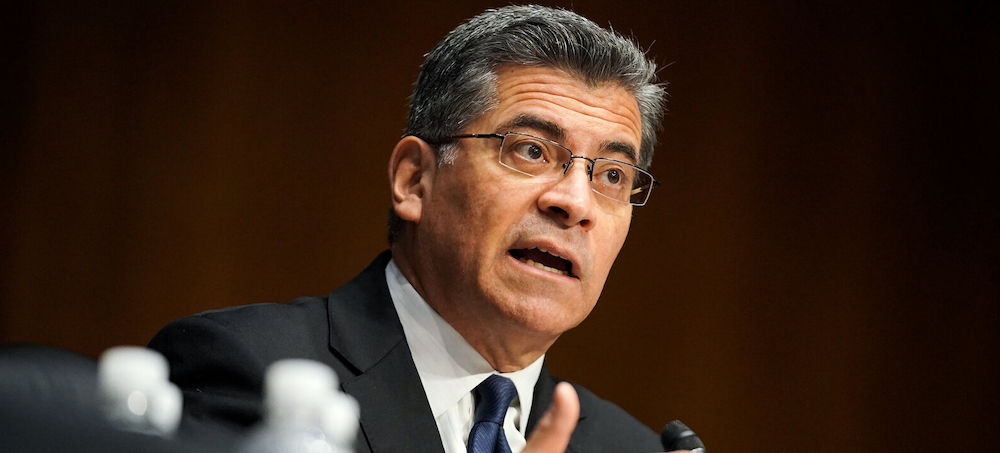 Health and Human Services Secretary Xavier Becerra. (photo: Greg Nash/NYT)
Health and Human Services Secretary Xavier Becerra. (photo: Greg Nash/NYT)
The proposed rules represent the Biden administration's plan to carry out the No Surprises Act, which Congress passed to spare patients from the shockingly high bills they get when one or more of their providers unexpectedly turn out to be outside their insurance plan's network.
The law — set to go into effect Jan. 1 — shields patients from those bills, requiring providers and insurers to work out how much the physicians or hospitals should be paid, first through negotiation and then, if they can't agree, arbitration.
Doctor groups and some medical associations, however, have lashed out at the interim final rules that HHS unveiled last month, saying they favor insurance companies in the arbitration phase. That's because although the rules tell arbiters to take many factors into account, they are instructed to start with a benchmark largely determined by insurers: the median rate negotiated for similar services among in-network providers.
The bottom line is protecting patients
The doctor groups say giving the insurers the upper hand will let them drive payment rates down and potentially force doctors out of networks or even out of business, reducing access to health care.
The department has heard those concerns, Becerra says, but the bottom line is protecting patients. Medical providers who have taken advantage of a complicated system to charge exorbitant rates will have to bear their share of the cost, he says, or close if they can't.
"I don't think when someone is overcharging that it's going to hurt the overcharger to now have to [accept] a fair price," Becerra says. "Those who are overcharging either have to tighten their belt and do it better, or they don't last in the business."
"It's not fair to say that we have to let someone gouge us in order for them to be in business," he adds.
Nonetheless, Becerra says he does not foresee a wave of closures, or diminished access for consumers. Instead, he suggests, a competitive, market-driven process will find a balance, especially when consumers know better what they are paying for.
"We're willing to pay a fair price," he says but emphasizes that "I'll pay for the best, but I don't want to have to pay for the best and then three times more on top of that and get blindsided by the bill."
The sticking point: How high bills are negotiated and arbitrated
Becerra also points to a report on surprise medical bills the HHS released Monday and that was provided to Kaiser Health News in advance, highlighting the impacts of negotiation and arbitration laws already in effect in 18 states.
The report, which aggregates previous research, found people getting hit with surprise bills averaging $1,219 for anesthesiologists, $2,633 for surgical assistants, $744 for childbirth and north of $24,000 for air ambulances.
In the states that use benchmarks similar to what doctors are suggesting HHS use instead of the agency's current proposal — such as New York and New Jersey — the report found costs rising. New York, for example, has a "baseball-style" system in which the arbiter chooses between the offers presented by the provider and the insurer, although the arbiter is told to consider the offer closest to the 80th percentile of charges. "Since the amount providers charge is typically much higher than the actual negotiated rate, this approach risks leading to significantly higher overall costs," the report finds. In New Jersey, billed charges or "usual and customary" rates are considered.
"When the arbitration process is wide open, no boundaries, at the end of the day health care costs go up, not down," Becerra says of the methods doctors prefer. "We want costs to go down. And so we want to set up a system that helps provide the guideposts to keep us efficient, transparent and cost-effective."
The system chosen by the Biden administration is expected to push insurance premiums down by 0.5% to 1%, the Congressional Budget Office estimates.
"Everyone has to give a little to get to a good place," Becerra says. "That sweet spot, I hope, is one where patients ... are extracted from that food fight. And if there continues to be a food fight, the arbitration process will help settle it in a way that is efficient, but it also will lead to lower costs."
While the administration chose a benchmark that physician and hospital groups don't like, the law does specify that other factors should be considered in setting the price for a medical procedure or service, such as a provider's experience, the market and the complexity of a case. Becerra said those factors help ensure arbitration is fair.
"What we simply did was set up a rule that says, 'Show the evidence,'" Becerra says. "It has to be relevant, material evidence. And let the best person win in that fight in arbitration."
The interim final rules were published Oct. 7, giving stakeholders 60 days to comment and seek changes. More than 150 members of Congress, many of them doctors, have asked HHS and other relevant federal agencies to reconsider before the law takes effect Jan. 1. These lawmakers charge that the administration is not adhering to the spirit of the compromises Congress made in passing the law.
Rules that are this far along tend to go into effect with little or no changes, but Becerra says his department is still listening. "If we think there's a need to make any changes, we are prepared to do so," the secretary says.
The HHS report also notes that the law requires extensive monthly and annual reporting to regulators and Congress, once it takes effect, to determine if the regulations are out of whack or have undesirable consequences like those the physicians are warning of.
Becerra says he thinks the rules strike the right balance, favoring not insurers or doctors, but the people who need medical care.
"We want it to be transparent, so we can lead to more competition and keep costs low. Not just for the payer, the insurer; not just for the provider, the hospital or doctor; but for the patients especially," he says.
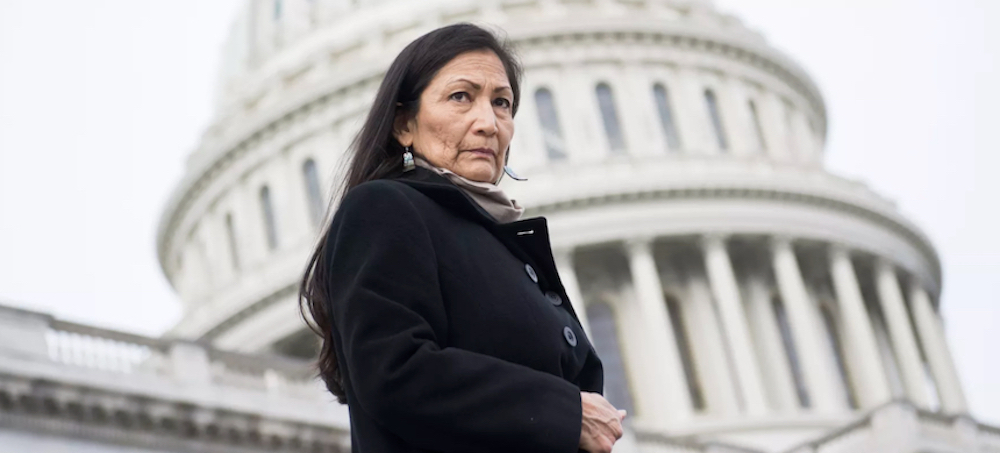 Secretary of the Interior Deb Haaland. (photo: Tom Williams/CQ-Roll Call/Getty Images)
Secretary of the Interior Deb Haaland. (photo: Tom Williams/CQ-Roll Call/Getty Images)
This swath of northwestern New Mexico has been at the center of a decades-long battle over oil and gas development.
On Monday, U.S. Interior Secretary Deb Haaland joined pueblo leaders at the park to reflect on her office's announcement last week that it would seek to withdraw federal land holdings within 10 miles (16 kilometers) of its boundary, making the area off-limits to oil and gas leasing for 20 years.
The action halts new leases in the area for the next two years while federal officials consider the proposed withdrawal.
“This celebration is decades in the making,” Haaland said. “Some would even say millennia in the making.”
While the Chaco area holds significance for many Indigenous people in the Southwest, the Navajo Nation oversees much of the land that makes up the jurisdictional checkerboard surrounding the national park. Some belongs to individual Navajos who were allotted land by the federal government generations ago.
Navajo leaders support preserving parts of the area but have said individual allottees stand to lose an important income source if the land is made off-limits to development. They're calling for a smaller buffer of federal land around the park as a compromise to protect Navajo financial interests.
The rough road to the park was lined with brightly colored signs Monday in support of the allottees, many noting the importance of oil and gas development to their livelihoods.
“Our land, our minerals. We support oil and gas," read one sign.
Another said Haaland hasn't met with allottees. Haaland told reporters later Interior officials have spoken with allottees.
Environmentalists, Democratic politicians and other tribes had been pressuring Haaland — the first Native American to lead a U.S. Cabinet agency — to protect a broad swath of land beyond the park.
A former Democratic congresswoman from New Mexico, Haaland sponsored legislation during her U.S. House term to curb oil and gas drilling. She has called the area sacred, saying it has deep meaning for those whose ancestors once called the high desert home.
“This is a living landscape,” Haaland said Monday. “You can feel it in the sun, the clouds and the wind. It’s not difficult to imagine centuries ago children running around the open space, people moving in and out of doorways, singing in their harvest or preparing food for seasons to come — a busy, thriving community.”
A World Heritage site, Chaco is thought to be the center of what was once a hub of Indigenous civilization. Within the park, walls of stacked stone jut up from the bottom of the canyon, some perfectly aligned with the seasonal movements of the sun and moon. Circular subterranean rooms called kivas are cut into the desert floor.
More discoveries are waiting to be made outside the park, archaeologists have said.
The fight over drilling beyond the park has spanned multiple presidential administrations. The Trump and Obama administrations also put on hold leases adjacent to the park through agency actions, but activists want the area permanently protected.
The Biden administration and Haaland's agency have vowed to consult with tribes over the next two years as the withdrawal proposal is considered, but top Navajo leaders already have suggested they're being ignored. Noticeably absent Monday were the highest elected leaders of the tribe's legislative and executive branches.
Navajo Nation Council Delegate Daniel Tso talked about the significant cultural ties that Navajos have to the area and cited concerns about increasing traffic, dust and other pollution that stems from oil and gas development. He called the recent executive orders a “giant step.”
“It creates a process where we have to continue to stand up for the land, stand up for the air, stand up for the water, stand up for the sacred,” he said.
Other tribal lawmakers and allottees have called for congressional field hearings to be held before any decisions are made.
“The Interior Department unilaterally made this withdrawal proposal without proper tribal consultation, now directly affecting our families on the Navajo Nation. The (Bureau of Land Management) now wants to initiate formal tribal consultation after the fact,” Navajo Council Delegate Mark Freeland said last week following Haaland's announcement.
Navajo Council Speaker Seth Damon also has said the Biden administration needs to respect tribal sovereignty and the government-to-government relationship it has with the tribe.
Federal officials said the ban on new petroleum leasing in the area will not affect existing leases or rights and would not apply to minerals owned by private, state or tribal entities. The Navajo allottees have argued it wouldn't be economical for companies to continue development just on their land.
Navajo officials also noted that Congress commissioned a cultural resource investigation of the area to be performed by experts. That work is ongoing, and they suggested the Biden administration wait until those results are compiled before initiating the 20-year withdrawal.
Haaland encouraged people to help inform land management going forward. She said she couldn't help but think of her grandmother's home in Mesita Village, in Laguna Pueblo, when she looked at how carefully the stones were set at Chaco to build the walls that enveloped its residents and visitors with great care and love.
“The responsibility we all have to our future generations is to take care of our American heritage and to model our care of the earth after the people who once lived among these beautiful structures,” she said.
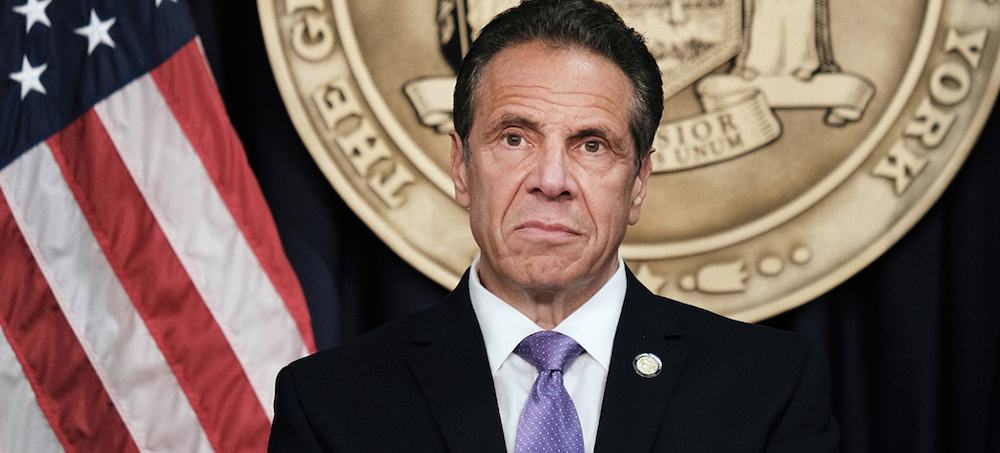 Andrew Cuomo. (photo: Spencer Platt/Getty Images)
Andrew Cuomo. (photo: Spencer Platt/Getty Images)
“This has been a profoundly sad chapter in New York’s history,” said New York State Assembly Speaker Carl Heastie, adding that they will “continue to cooperate with all relevant investigative bodies to provide them with the evidence we have uncovered.” Chairman Charles Lavine thanked members of the investigative committee and deemed Cuomo’s conduct “extremely disturbing and indicative of someone who is not fit for office.” He encouraged implementing a more “ethical and responsible” government, saying, “New Yorkers deserve no less.”
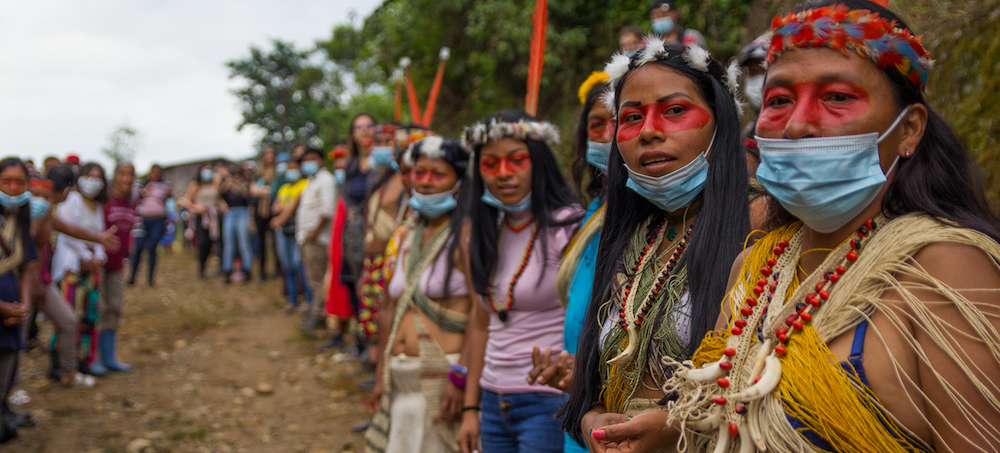 Waorani women are seen lining up with some 300 other visitors, forming a corridor to welcome the Constitutional Court judges the morning of the hearing on November 15, 2021. (photo: Kimberley Brown/Mongabay)
Waorani women are seen lining up with some 300 other visitors, forming a corridor to welcome the Constitutional Court judges the morning of the hearing on November 15, 2021. (photo: Kimberley Brown/Mongabay)
“I’m very excited because this is something historic, I have never heard of [judges] going to a hearing in a community,” Alexandra Narvaez, a resident of Sinangoe and president of the women’s association Shamecco, told Mongabay before the hearing began.
In previous hearings and other procedures in the city, “Only 10 people go, the whole community cannot go. So this hearing, we are all going to talk,” she said. “Our opinion is important.”
The hearing itself was part of the court’s process to review Ecuador’s free, prior and informed consultation process, or FPIC, using as a basis of analysis Sinangoe’s 2018 lawsuit, when the community sued the government for selling mining concessions on their territory without consulting with the community first, and won.
According to Ecuador’s constitution, Indigenous and tribal communities have a right to the process of FPIC before any extraction or infrastructure activity is planned on or near their land. In looking at Sinangoe’s case, the Constitutional Court will assess whether the consultation process, as it works today, adheres to these rights. If the court decides that it doesn’t, it could set new standards for consultation, which could grant Indigenous communities greater autonomy over their own land.
“This isn’t only good for us, but also for other communities and can guide them to defend their territory, to defend the decision they take,” said Nixon Andy, former coordinator of the Cofan guardia, or self-defense group, adding, “if Indigenous communities say ‘no mining’ it means no mining.”
More than 300 Indigenous leaders traveled to Sinangoe to show support for the hearing and consultation review process, and quickly filled the normally calm and quiet community. People traveled from all over the Amazon, and other areas in the country where territorial conflicts are prevalent with mining, oil and other infrastructure projects.
Oswaldo Nenquimo, Indigenous Waorani leader from the province of Pastaza, says their group traveled two days to attend the hearing: one day by canoe to reach the jungle city of Puyo farther south, and another day by bus. The Waorani community won their own historic lawsuit against the government in 2019 over a consultation process to sell their territory for oil exploitation, which the community said was fraudulent, and judges agreed.
“We have come almost two days to be part of this, to present our strength and wisdom and to support this process of struggle of Sinangoe, and to link our thoughts in this hearing,” Nenquimo told Mongabay. The Constitutional Court has also selected the Waorani case as part of its review, but has not yet set a date for the hearing.
For the community and their visitors, the day began at 4 a.m., not with coffee, but rather with a traditional Cofan drink called yoko, derived from the bark of a special vine with the same name found only in the Amazon. Mixed with water, it provides a burst of energy. This is part of the daily routine of the Cofan guardia.
When the five judges arrived at around 9 a.m., they were greeted by the community with a traditional Kichwa fire ceremony and a cleansing by a Cofan taita, or spiritual healer, to clear away bad energies.
The hearing lasted nearly four hours, during which the six of the nine Constitutional Court judges (five of whom were present, and a sixth who appeared via Zoom) heard testimony from 10 people from the Cofan community, as well as the other ministries involved in the original lawsuit. The Ministry of Energy and Nonrenewable Natural Resources were the only ones with representatives also present in the community, while the Ministry of Environment, Water and Ecological Transition, the Ministry of Energy and Non-Renewable Natural Resources and the Attorney-General’s Office also tuned in via Zoom.
Judges then heard testimony from other communities about their own territorial conflicts, stemming, they say, from a failed FPIC process.
Representatives from the Ministry of Energy and Nonrenewable Natural Resources refused to comment directly to Mongabay on the process. But during the hearing, one of their attorneys, Eduardo Andrés Chang Dávila, told judges that the Constitutional Court must also protect the rights of the state to manage its strategic sectors, such as oil and mining, which is also outlined in the constitution, calling such sectors a “fundamental pillar of the development of the country.”
Both oil and mining combined account for more than 8% of Ecuador’s GDP. Earlier this year, President Guillermo Lasso called for the rapid expansion of both sectors (as Decree 95 and 151), to address the country’s economic woes that have seen unemployment and poverty rise during the pandemic.
Lina Maria Espinosa, senior attorney with Amazon Frontlines, the environmental NGO that has been supporting the Sinangoe community with their legal process, said expediting these industries “obviously generates pressure on Indigenous territories.”
She called the current hearing with the Constitutional Court a “historic opportunity” for the court to listen to communities and adequately interpret their rights.
“The challenge for the court is to make that qualitative leap from consultation to consent,” she told Mongabay, calling the current FPIC process an empty formality. “The only way to protect and guarantee the life of the peoples and their territories is through consent.”
The Constitutional Court will now review the evidence, but it is unclear when a ruling can be expected.
This article was originally published on Mongabay.
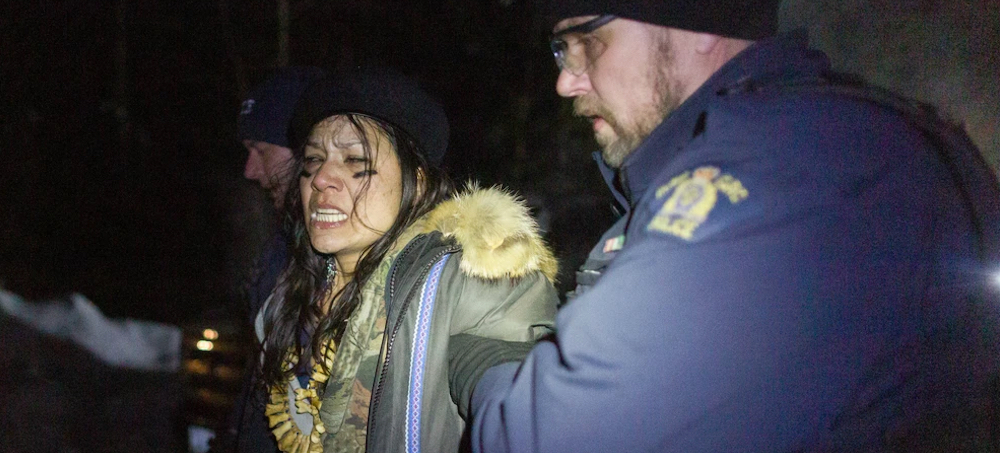 A Wet'suwet'en land defender under arrest. (photo: Jesse Winter)
A Wet'suwet'en land defender under arrest. (photo: Jesse Winter)
It’s the third year in a row police have enforced injunctions in the area using militarized force.
According to reports, RCMP descended on a resistance camp on Friday as part of its multi-day raid. The camp, erected on Sept. 25, had stalled Coastal GasLink’s efforts to drill a tunnel for their $6.6 billion pipeline under the sacred Wedzin Kwa river. Two freelance journalists, Amber Bracken and Michael Toledano, were arrested on site. Bracken was on assignment for the Narwhal, an online environmental magazine, and Toledano is a documentary filmmaker who has been on site for years. The journalists are still being detained and are awaiting a bail hearing in Prince George.
“RCMP has gone outside the law in its efforts to prevent the press from covering events taking place in the public interest. It is an absolute disgrace,” the Canadian Association of Journalists said in a statement Saturday.
Last Sunday, pipeline resistance leaders with the Wet’suwet’en Gidimt’en Clan evoked an eviction order, first issued by hereditary chiefs in 2020, to Coastal GasLink workers, giving them eight hours to “peacefully” leave the territory.
“Wetlands have been destroyed. Our animals have been sick. We need to protect what is left for all the future generations,” said Sleydo’, also known as Molly Wickham, a spokesperson with Gidimt’en.
After the deadline passed, they seized a Coastal GasLink excavator and dug up a road—the only route that gave access to several work sites and camps housing about 500 people, the Narwhal reported.
Four days later, police moved in and enforced a B.C. Supreme Court injunction order, which protects the pipeline’s development. According to the Narwhal and APTN, police used canine units and were armed with snipers and assault rifles. Sleydo’ was among those arrested out of about 30 Indigenous land defenders and leaders.
Wet'suwet'en elected officials have approved the pipeline project, but hereditary chiefs, viewed by many as the rightful leaders, haven’t. In early 2020, their supporters blocked critical infrastructure across Canada in a national display of solidarity.
According to Sleydo’, Wet’suwet’en hereditary chiefs have never ceded, surrendered, or lost title to their territory in war. “That means that what they say goes,” Sleydo’ said.
Many, including Gidimt’en Clan, say Wet’suwet’en hereditary chiefs have a constitutional right—affirmed by the Supreme Court of Canada’s 1997 Delgamuukw decision—to reject energy projects on their territory.
The decision affirmed Wet’suwet’en land title rights, but also said they are “not absolute.”
It’s the third year in a row police have enforced injunctions in the area using militarized force.
Police told the media they read out the injunction order and issued several warnings before forcibly making arrests. They said they also have had to clear felled trees and equipment from roadways to make them passable for construction workers.
Wet’suwet’en hereditary chiefs issued a joint statement last week condemning the police actions.
“RCMP should be assisting flood victims and communities, not out invading our Territory and arresting our peaceful people and supporters,” they said.
The raids occurred as the province grappled with a catastrophic storm that flooded several communities, destroyed highways, and killed at least four people.
Supporters of Wet’suwet’en hereditary chiefs mobilized across Canada over the weekend.Editorial Guide
Last year, a reporter for VICE World News was detained while reporting on the RCMP raids.
Follow us on facebook and twitter!
PO Box 2043 / Citrus Heights, CA 95611

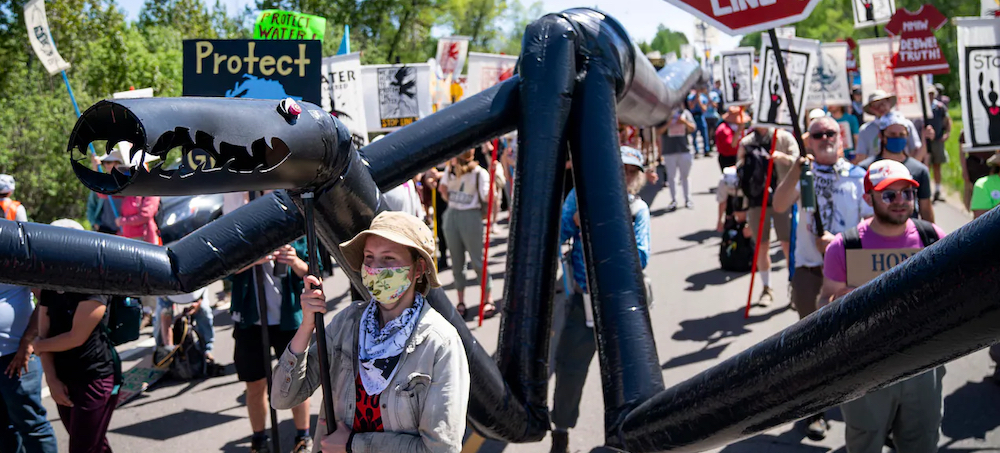

No comments:
Post a Comment